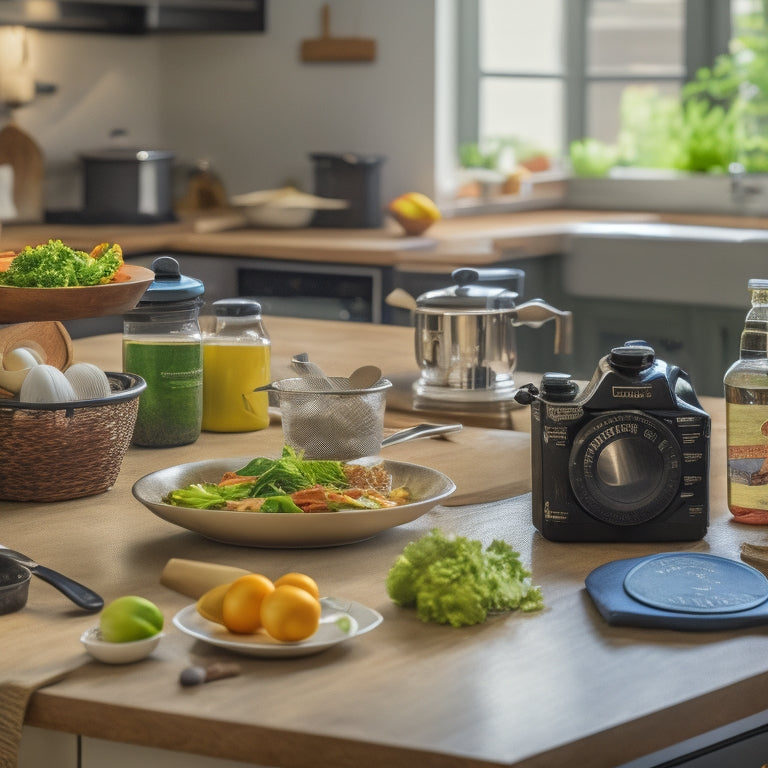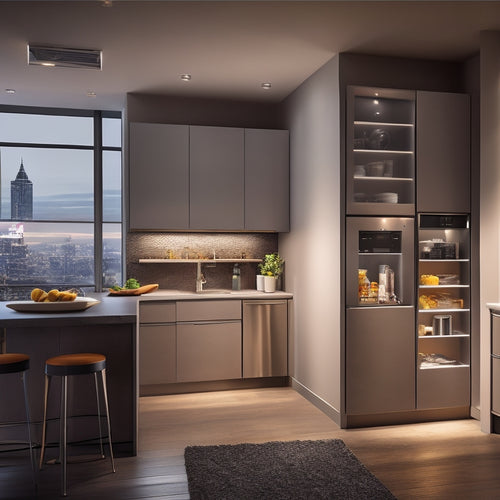
Why Kitchen Productivity Courses Fall Short
Share
You've likely invested time and money in kitchen productivity courses, only to find that they've failed to deliver the transformative results they promised. This isn't surprising, as many courses fall short due to unrealistic expectations, generic approaches, and a lack of personalized guidance. They often neglect your unique cooking habits, dietary preferences, and kitchen layout. What's more, ineffective meal planning strategies, inadequate consideration of kitchen layout limitations, and an overemphasis on perfectionism can hinder your progress. It's time to uncover the underlying reasons why these courses aren't working for you - and discover a more effective path to boosting your kitchen productivity.
Key Takeaways
• Kitchen productivity courses often promise unrealistic transformations, failing to provide personalized guidance and actionable strategies for individual needs.
• One-size-fits-all approaches neglect the importance of tailored coaching, leading to inefficient kitchen workflows and unmet expectations.
• Generic meal planning strategies ignore individual schedules, preferences, and dietary restrictions, resulting in unappetizing meals and wasted ingredients.
• Courses often overlook kitchen layout limitations, failing to optimize space, create clear zones, and strategically place appliances for maximum productivity.
• An overemphasis on perfectionism can hinder kitchen productivity, causing anxiety, slowing cooking speed, and decreasing effectiveness.
Unrealistic Expectations From Courses
You've likely been promised that a single kitchen productivity course can revolutionize your cooking skills, transform your meal prep routine, and turn your kitchen into a stress-free haven - but let's get real, these lofty claims often set you up for disappointment.
The truth is, mastering kitchen productivity requires more than just a one-size-fits-all approach. It demands a profound understanding of your unique cooking style, dietary needs, and time management habits.
Effective kitchen productivity courses should provide you with personalized guidance tailored to your specific needs. Instead of generic recipes and cooking techniques, you need actionable strategies that address your specific pain points, such as inefficient meal prep routines or poor time management.
A good course should help you identify areas for improvement, create a customized plan to optimize your kitchen workflow, and provide ongoing support to make certain you stay on track. Anything less is just a recipe for disappointment.
Lack of Personalized Guidance
One-size-fits-all kitchen productivity courses often fall short by neglecting to provide tailored guidance, leaving you to figure out how to apply generic strategies to your unique cooking style and needs. This lack of personalized guidance can be frustrating, especially when you're struggling to optimize your kitchen workflow. You need more than just a one-size-fits-all approach; you need customized strategies that cater to your specific strengths, weaknesses, and goals.
Without personalized coaching, you're left to navigate the complexities of kitchen productivity on your own. You might waste time and energy trying to adapt generic advice to your kitchen, only to find that it doesn't work for you.
A good kitchen productivity course should offer tailored guidance that takes into account your cooking habits, dietary preferences, and kitchen layout. With personalized coaching, you'll receive actionable advice that's tailored to your unique needs, helping you to streamline your kitchen workflow and achieve your goals faster.
Ineffective Meal Planning Strategies
Generic meal planning strategies often fail to consider your hectic schedule, food preferences, and ingredient availability, leaving you with a plan that's unrealistic and unsustainable. You're left with a bunch of recipes that don't suit your lifestyle, resulting in wasted time and money.
Additionally, these generic strategies rarely take into account your dietary restrictions, allergies, or dislikes, leading to meal plans that are unappetizing and uninviting. This lack of personalization leads to limited creativity in the kitchen, causing you to fall into a culinary rut. You're stuck cooking the same old dishes, without any inspiration or motivation to try new flavors and ingredients.
What's more, these generic meal plans often result in ingredient waste, as you're required to buy ingredients that you may not use again. This not only wastes your money but also contributes to food waste, a significant environmental concern.
Ignoring Kitchen Layout Limitations
Inadequate consideration of your kitchen's unique spatial constraints can turn meal prep into a frustrating obstacle course, forcing you to navigate around awkwardly placed appliances and cramped countertops. You're not alone if you've ever felt like you're constantly shifting around your kitchen, trying to find a clear path to the sink or stove. This is where space optimization comes in – understanding how to make the most of your kitchen's layout to streamline your workflow.
| Layout Element | Functional Design Principle | Optimization Tip |
|---|---|---|
| Countertops | Clear zones for prep and cooking | Designate specific areas for each task to reduce clutter |
| Appliances | Strategic placement for easy access | Place frequently used appliances in easy-to-reach locations |
| Storage | Maximize vertical space | Install shelves or cabinets that go up to the ceiling |
| Workflow | Create a logical traffic pattern | Position your most-used items along the path you take most often |
Overemphasis on Perfectionism
By striving for culinary perfection, you may unknowingly be hindering your kitchen productivity, as an excessive focus on impeccable presentation and taste can result in an unhealthy fixation on detail that hampers your cooking speed. This relentless pursuit of perfectionism pressure can impede your individual advancement, making you feel like you're trapped in a routine.
You begin to excessively contemplate every step, every cut, and every mix, which not only raises your anxiety levels but also diminishes your overall effectiveness.
Consequently, you might discover yourself investing more time on a single dish than required, rather than optimizing your workflow to accomplish more in a shorter period. The paradox is that this pursuit of perfectionism frequently results in flaws, as the additional pressure can lead to errors and mishaps.
Recognizing that kitchen productivity isn't solely about crafting a faultless dish, but about generating high-quality food efficiently, is crucial. By releasing the necessity for perfection, you can liberate yourself from the constraints of unrealistic expectations and concentrate on making progress, not perfection.
Failure to Address Root Causes
As you focus on refining your cooking skills, you're likely to overlook the underlying issues that hinder your kitchen productivity, perpetuating a cycle of inefficiency that slows you down. This oversight can be attributed to a failure to address the root causes of your productivity woes.
Here are 3 common pitfalls that kitchen productivity courses often neglect:
-
Lack of accountability: Without a system in place to track your progress and hold yourself accountable, you'll struggle to identify areas for improvement, making it difficult to optimize your workflow.
-
Misaligned priorities: When you're not clear on what needs to be done, you'll waste time on non-essential tasks, derailing your productivity.
-
Inadequate workflow design: A poorly designed workflow can lead to bottlenecks, inefficiencies, and frustration, making it impossible to achieve your kitchen goals.
Insufficient Time Management Skills
You'll frequently find yourself scrambling to complete tasks on time because you haven't developed the time management skills necessary to prioritize and sequence your kitchen activities effectively. This is a major oversight in many kitchen productivity courses.
Without a solid understanding of time management, you'll struggle to optimize your workflow, leading to wasted time and energy. To overcome this, you need to focus on prioritizing tasks based on their urgency and importance. This means identifying the most critical tasks that require your attention and tackling them first.
Additionally, you must learn to avoid distractions that can derail your productivity, such as checking social media or getting sidetracked by non-essential tasks. By mastering these skills, you'll be able to complete tasks efficiently, reduce stress, and achieve a sense of control in your kitchen.
Unrealistic Storage Solution Promises
In addition to inadequate time management skills, many kitchen productivity courses also make unrealistic promises about storage solutions, claiming that a single organizational system or tool can magically eliminate clutter and optimize your kitchen's layout. You're led to believe that a specific product or method will transform your kitchen into a haven of efficiency, but this is far from the truth.
Here are 3 reasons why these promises fall short:
-
One-size-fits-all solutions: These courses often promote a single storage solution that may not be adaptable to your unique kitchen layout or needs.
-
Ineffective organization: The promised organizational systems may not address the root causes of clutter, leading to a temporary fix that doesn't last.
-
Impractical solutions: Some courses suggest impractical solutions that require a complete overhaul of your kitchen, which can be costly and time-consuming.
You deserve better than ineffective organization and impractical solutions. It's time to rethink your approach to kitchen productivity and focus on tailored, realistic solutions that address your specific needs and challenges.
Frequently Asked Questions
Can Kitchen Productivity Courses Be Customized for Left-Handed Individuals?
You'll be interested to know that 20% of top chefs are left-handed! When it comes to kitchen productivity courses, you can definitely find ones that cater to left-handed individuals with specialized adaptations, techniques, and equipment, maximizing your culinary potential.
How Do Courses Handle Kitchen Renovations or Construction Delays?
When dealing with kitchen renovations or construction delays, you'll need to adjust your budget management and time management skills. Effective communication strategies and problem-solving techniques will help you navigate these challenges and stay on track.
Are Courses Suitable for People With Severe Food Allergies or Intolerances?
When tackling kitchen productivity, you'll find courses often overlook important considerations for those with severe food allergies or intolerances, neglecting essential discussions on ingredient substitutions and cross contamination risks that can be life-threatening.
Do Courses Provide Guidance on Kitchen Tool Maintenance and Repair?
Imagine you're a busy chef, and your trusty knife suddenly breaks mid-service; you'll wish you had learned tool maintenance and repair in that kitchen productivity course. Most courses overlook teaching you tool organization, sharpening, cleaning, and troubleshooting, leaving you in a lurch.
Can Courses Accommodate Non-Traditional Kitchen Spaces, Like Tiny Homes?
You'll find that excellent courses adapt to your unique needs, offering small space solutions, organization tips, and creative layouts to maximize efficiency in tiny homes, ensuring you can whip up a storm in even the most compact kitchens.
Related Posts
-

Revolutionize Your Kitchen With Smart Storage Solutions
You're about to reveal the secret to a kitchen that's both stunning and super functional. By incorporating smart stor...
